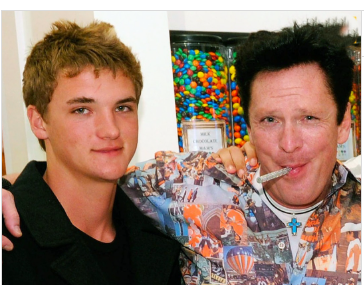Despite being an iconic figure in film thanks to his gruff voice and intimidating demeanor, Michael Madsen’s sadness was a major burden in his latter years. In addition to being a personal sorrow, his son Hudson’s death in 2022 served as a reminder of how even the strongest lives may be altered by loss. The tale of a father and son whose paths were remarkably similar in that they became symbols of resiliency and grief was reopened two years later when Michael passed away at the age of 67.

Born in 1995, Hudson preferred service to fame. Friends characterized his decision to join the U.S. Army as both brave and especially honorable. He served in Afghanistan during his career before relocating to Schofield Barracks in Hawaii, where he and his wife Carlie established a peaceful existence. They were married in 2017, and their relationship was frequently characterized as being exceptionally close and loving. However, Hudson had internal conflicts that were cruelly concealed from many, despite his self-control and external steadiness.
Michael Madsen – Life and Loss
| Category | Details |
|---|---|
| Full Name | Michael Madsen |
| Born | September 25, 1957 – Chicago, Illinois, USA |
| Died | July 3, 2024 – Los Angeles, California, USA |
| Age | 67 |
| Occupation | Actor, Poet, Producer |
| Notable Works | Reservoir Dogs, Kill Bill: Vol. 2, The Hateful Eight, Donnie Brasco |
| Family | Estranged wife (DeAnna), three sons |
| Son | Hudson Madsen (1995–2022) |
| Cause of Death | Cardiac arrest |
At the age of 26, Hudson committed suicide on Oahu in January 2022. Carlie’s homage was heartbreakingly straightforward: she simply wrote, “I love you more,” after adding his name and dates to her Instagram account. This remarkably unambiguous expression of affection offered a peek into a relationship abruptly broken. The discomfort was too much for Michael. He recounted Hudson’s final words in interviews: “I love you, dad.” Later, he told the Los Angeles Times that he was baffled by how a young man who had aspirations of starting a family could disappear so abruptly. His thoughts revealed the unvarnished nature of a father looking for solutions that never came.
“We are heartbroken and overwhelmed with grief and pain at the loss of Hudson,” the family’s official statement said, emphasizing their shared sorrow. Everyone who knew and loved him will cherish his memories and light. Those statements had more weight because they showed the softer side of an actor who usually played tough roles, but they also matched sentiments heard in innumerable homes affected by suicide.
The loss of Hudson also put a great deal of stress on the family. After decades of marriage, Michael filed for divorce from his wife, DeAnna, in September 2024. According to reports, he thought her behavior was a factor in their son’s difficulties. It was an agonizing disintegration of a once-exceptionally strong union and demonstrated how sadness can shatter seemingly indestructible bonds.
Michael’s own passing in July 2024 gave the story a new dimension. Although his managers acknowledged that he had experienced cardiac arrest, many supporters made the connection between his deteriorating health and the emotional toll of losing his son. Research consistently demonstrates that severe grieving is closely related to physical illnesses, and broken-heart syndrome is more than simply a metaphor. For many, his death came to represent the destructive force of unrelieved grief.
However, Michael continued to be incredibly productive despite his anguish. He kept performing in stand-alone films such as Concessions and Resurrection Road. He was getting ready to publish Tears For My Father: Outlaw Thoughts and Poems, a collection of poetry that would capture the spirit of a man who had spent decades juggling personal destruction and Hollywood fame. He continued to move forward despite having a heavy heart, as evidenced by the comments made by managers and publicists that he was pleased about this new chapter.
His most renowned creative contributions are still his partnerships with Quentin Tarantino. His reputation as an actor capable of evoking lasting menace was cemented by the notorious torture scene in Reservoir Dogs, known as “Stuck in the Middle With You.” His roles in Once Upon a Time in Hollywood, The Hateful Eight, and Kill Bill: Vol. 2 solidified his place in Tarantino’s larger creative family. In addition, he voiced characters in computer games like Grand Theft Auto III and worked on movies like Donnie Brasco, Sin City, and Die Another Day. Despite having a turbulent personal life, his corpus of work established him as a very dependable character in American cinema.
Hudson’s passing also brought attention to the hidden difficulties that many veterans encounter after leaving the military. Although Hudson was highly regarded and disciplined, he carried unmanageable personal obligations. His tale is eerily reminiscent of the experiences of other troops who return home to face invisible conflicts. Michael unintentionally brought attention to the pressing need for more humane and effective support networks for veterans by bringing this story into the public eye.
Mental health issues have long plagued Hollywood, from Robin Williams to Anthony Bourdain. In addition to the sorrow of suicide, Madsen’s narrative highlights the intergenerational effects of mourning. Michael’s last years were influenced by Hudson’s passing, demonstrating how family trauma may have long-lasting effects that alter relationships and, in certain situations, shorten lives.
Despite this sadness, Michael’s artistic legacy endures in popular culture. In reflection, his portrayals of men who carried buried grief feel strikingly akin to his own reality, blending sensitivity with tenacity. Along with his talent, fans and coworkers today recall his life’s painful lesson: celebrity and toughness cannot protect someone from grief.
